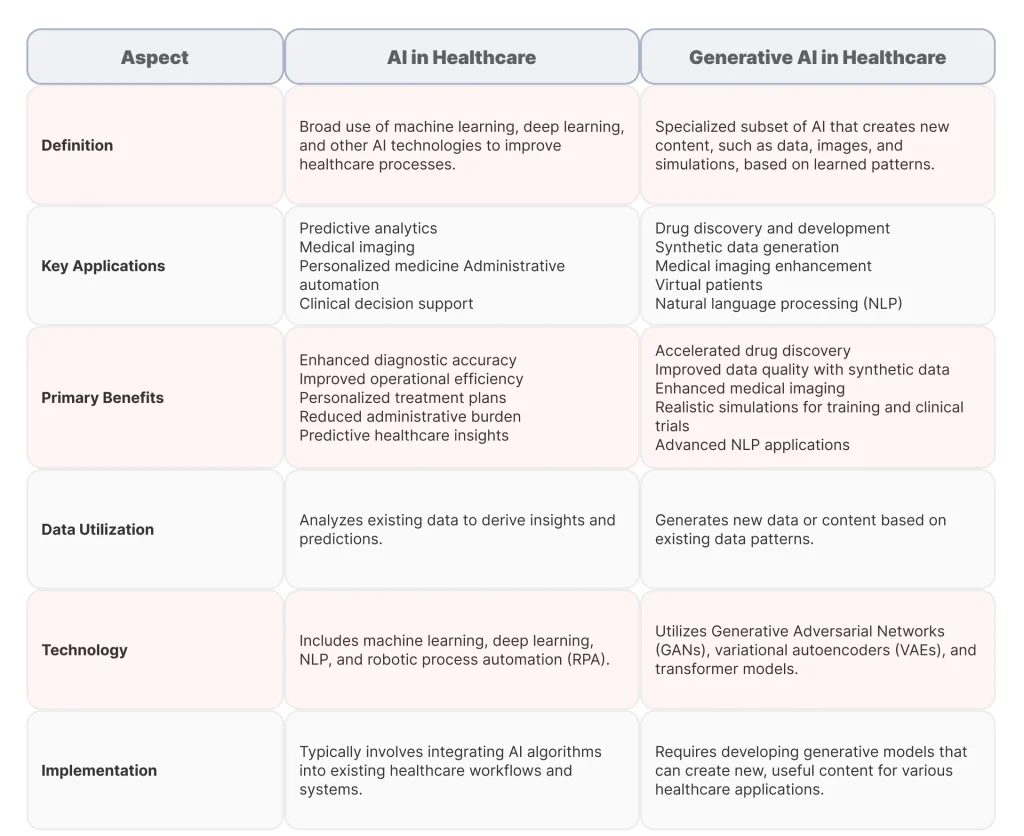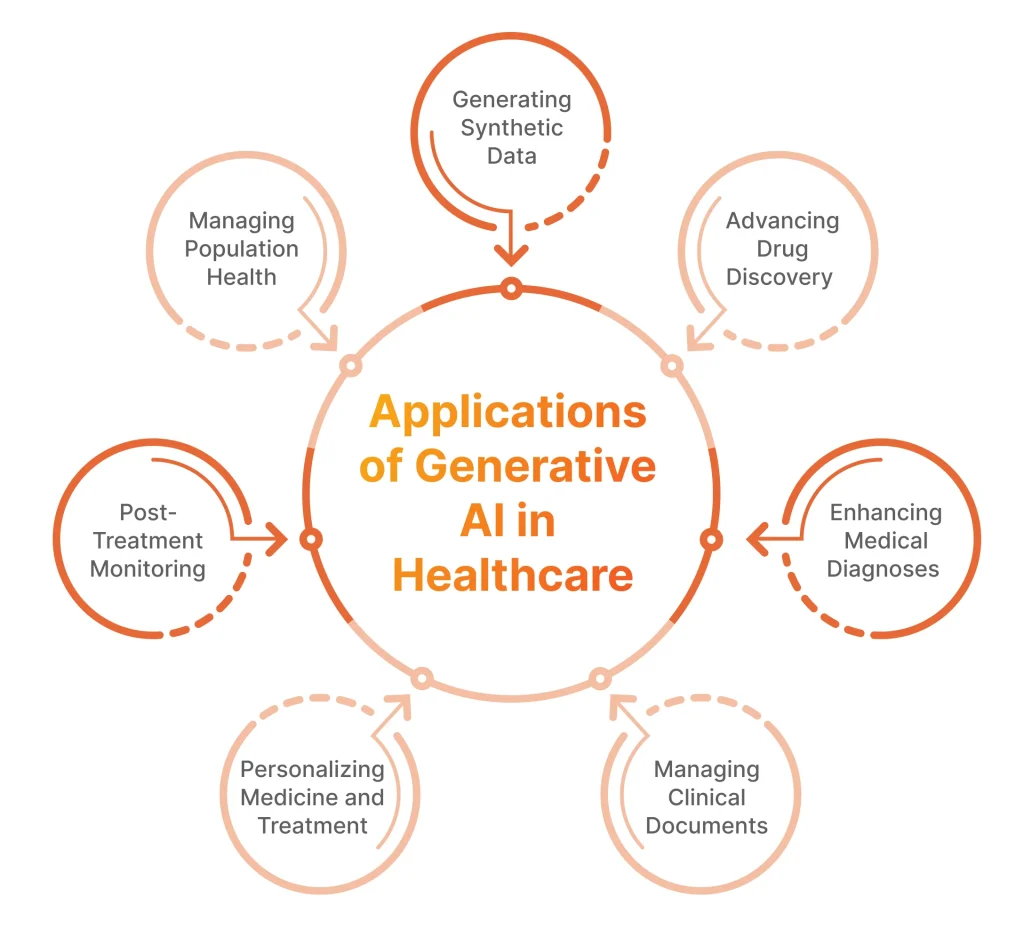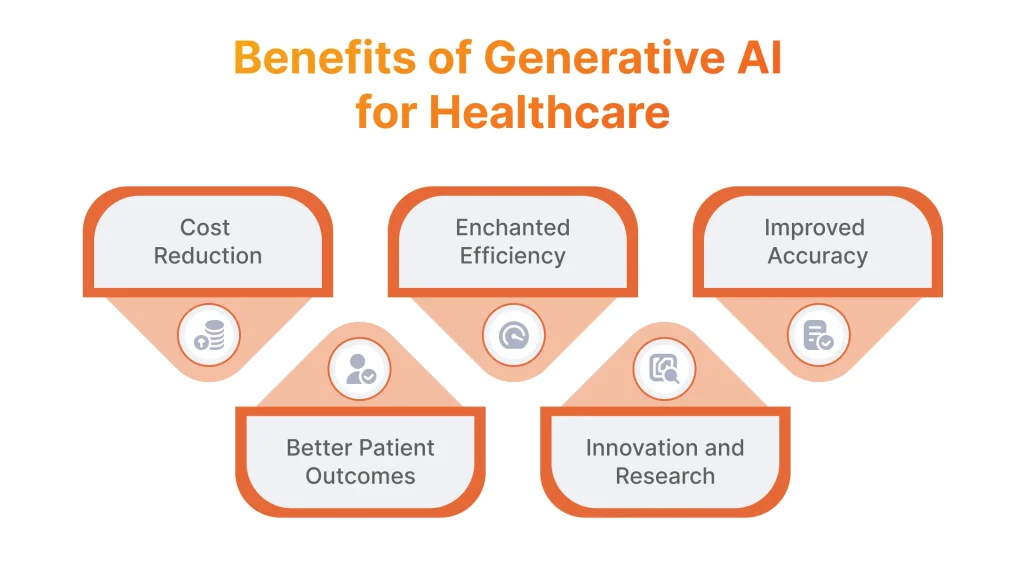Healthcare organizations across the globe are already at the forefront of AI adoption, as AI in the healthcare market is valued at USD 20.9 billion in 2024, and is forecasted to reach USD 148.4 billion by 2029, growing at a CAGR of 48.1%, according to Markets and Markets.
This tremendous growth is expected, since for healthcare, AI can offer technological capabilities that go beyond elevating customer service and automating administrative tasks. The technology is capable of delivering better treatments and boosting the effectiveness of medical professionals across the board, ultimately leading to better outcomes and transforming patient care.
With these significant benefits in mind, we will discuss the Generative AI for Healthcare, the latest trending technology that is already making waves and becoming much more than just the next big thing. So, why do investors see so much potential in the combination of Generative AI and Healthcare? How Intelligent Automation and assistance in the core medical activities are already delivering outstanding results? Let’s find out!
AI vs Generative AI in Healthcare – What’s the Difference?
Before starting to discuss the most promising applications of generative AI in healthcare, let’s discover what distinguishes this emerging technology from the artificial intelligence that have been there for some years already.

Scope and Functionality
AI/ML development services are delivered with the help of a wide range of techniques, approaches, and applications. Artificial Intelligence can perform a variety of different functions, including but not limited to classification, regression, clustering, and optimization. These functions are aimed at analyzing data, making predictions of patient outcomes, or automating decision-making processes. AI’s functionality is very broad and can be applied to numerous practical problems, replacing or augmenting human intelligence.
The focus of Generative AI is much more narrow and includes:
- Generating new data like medical images or patient records that can be used for training and research.
- Improving the quality and diversity of existing datasets to make them more effective for AI model training.
- Creating virtual simulations for training and research, such as modeling the spread of diseases or the impact of new treatments.
Use Cases
Artificial Intelligence and Machine Learning are widely used across various healthcare settings, including diagnostics, improving operational efficiency, and clinical decision-making.
As for Generative AI, it can be useful for:
- Creating new molecular structures and simulating their interactions with each other to accelerate the drug discovery process.
- Generating synthetic datasets, mimicking real-world data to train AI models while not compromising patient data privacy.
- Providing virtual environments for surgical simulations or emergency response drills.
Discover the latest 10 Disruptive Machine Learning Projects in Healthcare that change the game and elevate the industry to an entirely new level.
Technology and Methods
The most common technologies under the AI branch include Machine Learning, Deep Learning, Robotic Process Automation, and Natural Language Processing. They work best in combination; for example, the true impact of Natural Language Processing for business is maximized when integrated with advanced ML algorithms that derive insights from human language.
The key Generative AI tools on the other hand include:
- Generative Adversarial Networks (GANs): These typically consist of two neural networks, a generator and a discriminator. They work in cohesion to create synthetic data that is very close to a real one.
- Variational Autoencoders (VAEs): They work on encoding input data into a lower-dimensional space and then decode it back. As a result, a similar synthetic data is being created. Simply put, this can increase the business impact of Big Data, as the more data you have, the more useful data you can generate.
- Transformer Models: Utilizing extensive training data and attention mechanisms, these models generate unique texts, images, and other types of data.
Impact on Healthcare
The implementation of AI plays a major role in improving diagnostic accuracy, enabling clinicians to analyze data faster and make better, personalized decisions. Additionally, just like with any other industry that leverages AI/ML, you can expect the complete automation of simple repetitive tasks, reducing the workload on employees, and cutting operational costs as a result.

Serhii Leleko
ML & AI Engineer at SPD Technology
“The most intriguing thing about Generative AI technologies is their potential for driving the innovation forward. It unlocks unlimited possibilities for advanced development of clinical medicine and deep medical research that will help discover cures for diseases that previously were considered fatal. Crucially, it addresses the longstanding challenge of data privacy in healthcare research by providing a means to work with realistic data without compromising patient confidentiality. This approach ensures compliance with stringent regulations and ethical standards, thereby fostering trust and enabling responsible use of healthcare data”
Applications of Generative AI in Healthcare
According to the survey by Deloitte, 75% of leading Healthcare companies are experimenting with Generative AI or attempting to scale existing use cases. Below are some of the most prominent applications of generative AI in the healthcare sector.

Generating and Augmenting Synthetic Data
As mentioned previously, this is one of the most important uses of Generative AI in Healthcare. Synthetic data is a vital element in training Machine Learning models, validating algorithms, and conducting effective medical research, while at the same time with Generative AI it is possible to maintain 100% of patient confidentiality.
The critical area where data generation can become a significant breakthrough is dealing with rare diseases. Not only data is scarce here, to begin with, but when you add in privacy concerns, there can be a lack of essential information that will put a quest of medical researchers to find the cure to a dead end.
Advancing Drug Discovery and Development
Traditional drug discovery methods have always been very expensive and time-consuming. Sometimes it takes years, if not decades, to get any tangible results that will end up becoming a mass-produced medicine, so the potential savings for the global corporations are enormous here, in addition to live-saving value, of course.
Generative AI in Healthcare can simulate molecular interactions and generate new drug candidates, significantly reducing the time and cost involved. With this innovation, it is possible to create new molecular structures and predict their efficacy and safety, plus streamline the initial stages of the drug development process. With the power of GenAI, researchers can fully explore vast chemical spaces and invent drugs that might have been missed during conventional research.
Enhancing Medical Diagnoses and Imaging
The interpretations of medical images including X-rays, MRIs, and CT scans can be improved, as with Generative AI it is possible to augment existing imaging datasets, acting as effective diagnostic support tools. For example, radiologists can get assistance in detecting anomalies with far greater accuracy.
Additionally, Generative AI drives tremendous healthcare progress with the ability to create highly detailed 3D models from 2D images. This can be useful for aiding complex surgical planning and delivering greater insights into the condition of patients.
Managing Clinical Documentation and Administration
Administrative tasks remain a big time-consuming part of any Healthcare organization. Generative AI can help to eliminate this burden, specifically by:
- Automating the generation of clinical notes.
- Summarizing patient records.
- Extracting relevant information from vast amounts of data.
With the capabilities of Natural Language Processing combined with Generative AI, it is possible to turn spoken or written medical notes into detailed and accurate Electronic Health Records (EHRs), structured in the required format.
Personalizing Medicine and Treatment Plans
Thanks to the ability to analyze individual genetic information, and medical and treatment history, Generative AI can simulate how a particular treatment can affect a specific patient. This allows medical professionals to come up with customized treatment plans. One of the examples is in oncology, where the Generative AI can predict how various types of cancer treatments will work with the genetic makeup of the patient, resulting in therapies that will more likely lead to a positive outcome.
Monitoring and Follow-Up Post-Treatment
Remote monitoring of patients can be enhanced by using generative predictive models that can predict potential health issues and anticipate needs. It can be achieved by leveraging the sensors and health apps on the wearable devices, providing timely feedback, and ensuring on-point interventions. Generative AI can help in predicting possible complications for the patients after the surgery, reducing the risks of possible complications.
Managing Population Health
From the larger scale perspective, it is undeniable that Generative AI can play a significant role in managing the health of the entire population. Having access to large amounts of accurate health data, the technology will be able to uncover trends and predict possible disease outbreaks. It is a similar concept to Anomaly Detection with Machine Learning, which we talked about in one of our articles, and can help to allocate resources more effectively before a big outbreak takes place.

Serhii Leleko
ML & AI Engineer at SPD Technology
“In the pandemic environment, as we had with COVID-19, GenAI can lend a great hand in modeling the potential spread of the virus based on the data about infected people. This can predict hotspots and plan effective vaccination activities that will prevent a disease. In addition to that, it is possible to determine at-risk population groups to offer required activities to save lives.”
Benefits of Generative AI for Healthcare
While still considered relatively nascent, Generative AI in Healthcare already brings tangible advantages for organizations that embrace innovation and take a chance on implementing the new technology into their core processes. Let’s talk about what exact advantages healthcare companies can get by leveraging AI applications.

Cost Reduction
In a nutshell, Generative AI models are here to save money by transforming healthcare delivery. It can be achieved in several ways, streamlining essential processes across the board. The previously mentioned drug discovery process may cost billions of dollars for the enterprises, but with GenAI assistance in simulating molecular interactions, the potential drug candidates can be determined much faster, dramatically cutting the time required to bring new drugs onto the market.
The data collection process is very time-consuming and expensive for organizations as well, so generating synthetic data for the AI model training can significantly cut expenses. With synthetic data, a lot less real-world data needs to be acquired, and a healthcare organization can save on patient recruitment for clinical trials.
Enchanted Efficiency
Generative Artificial Intelligence can be considered a powerful productivity booster as well, as it improves efficiency in multiple areas of Healthcare. It can significantly speed up all document-related processes, just like it works with any other industry that uses Generative AI applications and can effectively derive valuable insights from large datasets. With the elimination of administrative burden, healthcare professionals will be able to focus more on improving patient outcomes and providing personalized care, instead of filling in the blanks for the tons of medical documents.
Improved Accuracy
Custom AI solutions development services for healthcare can benefit greatly from the data augmentation capabilities of Generative AI applications since they can improve the accuracy of existing models. In medical imaging, for example, Generative AI models can generate synthetic images of the highest quality that dramatically improve the training process for the diagnostic algorithms, leading to far more accurate disease detection. Thanks to generated data, and the diversity and accuracy it brings, diagnostic algorithms become much better in generalization and performance in the real-world environment.
Better Patient Outcomes
Medical experts can leverage GenAI to personalize medicine and treatment plans, leading to more positive patient health outcomes. It can be achieved thanks to rigorous analysis of the personal patient information and suggestions on how specific treatments will affect that patient, lowering the possibility of critical side effects.
Additionally, with AI-driven remote monitoring systems, it is possible to provide real-time feedback and early warnings for potential health issues.
Opportunities for Innovation and Research
Last but not least, Generative AI in Healthcare introduces entirely new groundbreaking innovations for moving the industry forward. This is especially true when GenAI is being combined with other technologies, for example in the Computer Vision development domain. These two technologies can detect anomalies in CT scans too subtle for human experts, leading to more accurate diagnoses, and with further advancements in technology, the results will be even better.
Due to working with different databases and in various settings, Generative AI in Healthcare also fosters collaboration across disciplines, combining insights from biology, chemistry, and computer science to drive innovation and unlock new solutions in traditional scenarios.
The Importance of Building Customer Trust for Adopting GenAI in Healthcare
Generative AI is truly capable of bringing significant benefits to the healthcare providers, and ultimately contributes to better patient outcomes and quality of life. Still, the issue of patient trust is the main roadblock on the way to its large-scale adoption. According to the recent survey, three out of four American patients don’t trust AI being used in the healthcare setting.
The most common concerns include patient’s safety and privacy, accuracy and reliability of AI-powered health systems, ethical considerations and lack of transparent communication about what AI is being used for. While nearly 80% of patients don’t know why and how their doctor uses artificial intelligence during treatment, the participants of the abovementioned survey consider disclosure of using AI important.
So, doctors aiming at ethical generative AI integration are welcome to improve communication transparency between them and their patients. To help alleviate concerns about data privacy and security, it will be a good idea to maintain open communication about the inner workings of GenAI systems, their specific benefits, and their limitations. Since education has the highest potential to improve trust, creating trusted and comfortable healthcare settings becomes especially important, raising patients’ awareness of how their data is used, stored and protected.
The highest adherence to regulatory standards and obtaining necessary certifications from authorities is crucial for generative AI in healthcare, just like with any other AI solution. A GenAI-enabled healthcare system should comply with all mandatory data protection regulations, the standards of medical devices, and current AI ethics guidelines to promote customer trust. In the next section, we will show how we build patient trust along with engineering a cutting-edge mobile app with advanced self-care functionality.
Our Project – Revolutionizing Healthcare with GenAI and Computer Vision
Here, at SPD Technology, we know how to put the above-mentioned strategies into practice, since we are delivering AI/ML, NLP, Augmented Reality, Computer Vision, and Generative AI solutions across numerous business verticals. From Fraud Detection with Machine Learning to advanced AI-powered Document Management solutions, we deliver tangible value for the organizations from the healthcare industry as well, helping them leverage and adopt groundbreaking technologies.
In one of our recent projects, we partnered with a B2C company operating in the Healthcare industry. Our customer helps people take care of their health and well-being, control the process of aging, and aesthetic wellness, and manage their health data in one place.
With these values in mind, we created a modern ML-powered web app and mobile app for iOS, covering mission-critical functionality for our client, allowing users to:
- Monitor health
- Connect with doctors and clinics
- Receive personalized recommendations
- Manage lab analysis in one place.
In this project, our expertise in Computer Vision, RAG chatbots, and Smart Devices with bioelectrical impedance data analysis truly shined. During the project development, we ensured 90%+ accuracy rate of our AI models, enabling the customer to push the progress in the industry, and, most importantly, help people to live long and healthy lives.
To address the challenge of ensuring customers’ trust, we followed the next practices to ensure data security:
- Implemented strong data encryption and secure data storage protocols
- Displayed how the data is collected, used, stored, and shared in our solutions
- Obtained explicit consent from users for data usage
- Conducted extensive testing and continued to improve our AI models
- Used diverse and representative training data to minimize bias and promote inclusivity.
Conclusion
It is safe to say Generative AI in Healthcare has arrived, and it’s offering new opportunities for more accurate diagnoses, efficient medical and administrative operations, and better patient outcomes. However, it is still important to promote responsible integration, as ensuring patient safety and protecting data privacy, is a notable obstacle and should be treated carefully by software development providers.
Our development team at SPD Technology is fully aware of all challenges related to AI adoption and is ready to boost your project with our extensive expertise. Let’s transform Healthcare and open up unprecedented opportunities for innovation and research for your organization!
FAQ
What is Generative AI in Healthcare?
This refers to the application of advanced Machine Learning models that can generate synthetic data, as well as enhance existing data, to support various processes in Healthcare.
How Can Generative AI Be Used in the Field of Healthcare?
The fullest potential of the technology is yet to be uncovered, however, currently, we can say that the areas that can benefit include:
- Drug Discovery and Development
- Medical Imaging
- Diagnostics
- Personalized Medicine
- Clinical Documentation
- Medical Education and Training.
In the Healthcare Industry, How Does Generative AI Contribute to Early Disease Detection?
It contributes to early disease detection by enhancing the capabilities of diagnostic tools and systems, generating synthetic data, and augmenting existing datasets to provide a more comprehensive range of examples for training diagnostic models. Generative AI models also help with improving the resolution and clarity of medical images and creating predictive models to analyze patients’ data.
How Does Generative AI Contribute to Personalized Medicine?
By analyzing genomic data, Generative AI can identify unique genetic markers and predict how patients will respond to different treatments, allowing for customized therapies. The technology also allows the monitoring of patient responses to treatments in real time and adjusts therapeutic approaches dynamically.
How Do Healthcare Professionals Interact with Generative AI Tools?
Numerous use cases have already proven effective interaction. In addition to complete automation of simple administrative tasks, GenAI can help with advanced diagnostic support, data-driven clinical decision-making, and training medical professionals.
How Does Generative AI Contribute to Improving Healthcare Efficiency and Workflow?
The technology already improves the workflow through several mechanisms, including:
- Automation of Routine Tasks
- Enhanced Data Utilization
- Optimized Resource Allocation
- Streamlined Communication.

